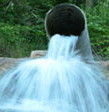Water & Waste - Bolivia
Over one third of Bolivia's potable water goes unbilled
August 16, 2013 - BNamericas.com
By Katherine Watkins - Friday, August 16, 2013
 About 35% of water produced in Bolivia goes unbilled, Edson Solares, head of water and sanitation authority AAPS, told BNamericas.
About 35% of water produced in Bolivia goes unbilled, Edson Solares, head of water and sanitation authority AAPS, told BNamericas.
Bolivia produces around 250 cubic hectometers (hm3) a year, with the volume of unbilled water reaching 87.5hm3 a year, he added.
CLANDESTINE CONNECTIONS
One of the main reasons water goes unbilled is due to clandestine connections. In La Paz and El Alto alone the volume of unauthorized water use due to clandestine connections reaches about 657,000m3/year, resulting in annual losses of 985,500 bolivianos (US$142,629) for state-run water utility Epsas which operates in La Paz and El Alto, according to Solares.
To help solve this problem, Bolivia's environment and water ministry (MMAyA) and AAPS launched an amnesty plan to regulate illegal water and sewage connections in the cities of La Paz and El Alto.
"In the first week there were few applications [to connect to the system], users were only inquiring about the plan." Two weeks after the amnesty plan 146 users self-disclosed their illegal connections, with 15 signing contracts to connect to the system. The amnesty plan will continue for three months.
With regards to Bolivia's other water and sanitation utilities (Epsa), "each Epsa is being evaluated separately, as there are 46 under regulation, they are being considered on a case by case basis because it's necessary to find an equilibrium between the social impact and sustainability of each Epsa," Solares said.